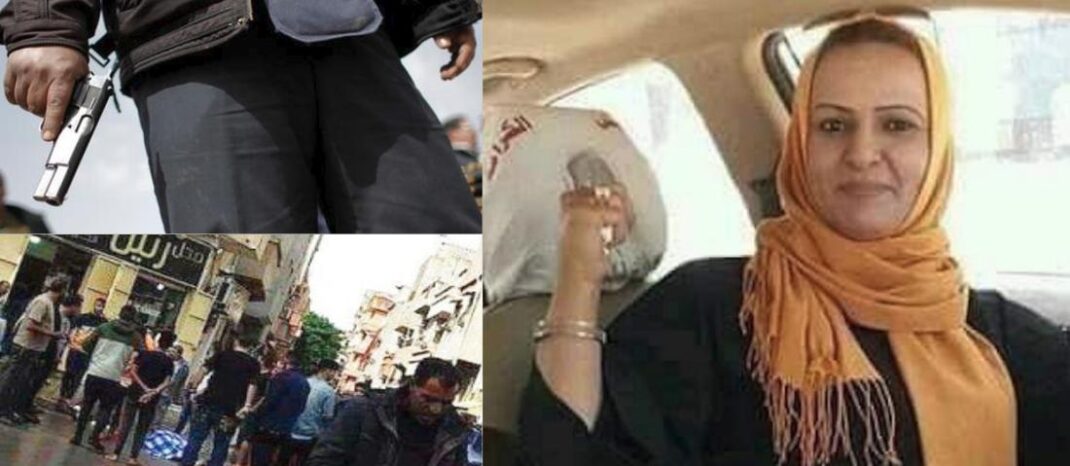By Jason Burke
 Hanan al-Barassi was an outspoken critic of abuses in areas controlled by the Libyan National Army.
Hanan al-Barassi was an outspoken critic of abuses in areas controlled by the Libyan National Army.
Gunmen have shot dead a prominent female dissident on a busy street in the eastern Libyan city of Benghazi, in the latest killing of a critic of military strongman Khalifa Haftar.
Hanan al-Barassi, an outspoken critic of abuses in the eastern areas controlled by Haftar’s Libyan National Army (LNA), was shot dead in her car in broad daylight on 20th Street, a busy artery in Benghazi’s city centre, rights groups and security officials said.
A prominent figure in Libya, 46-year-old Barassi was known for giving voice to female victims of violence in videos that she broadcast on social media.
She also ran a local association for the defence of women’s rights.
In the footage posted to her Facebook page just before she was shot, Barassi speaks to the camera while seated in her car and criticises armed groups close to Haftar, saying she had been “threatened”.
Barassi’s killing comes nearly a year and a half after the disappearance of another prominent women’s rights activist, Siham Sergiwa, who was abducted from her home in Benghazi by armed men on 17 July and has not been heard from since.
Before her abduction, Sergiwa had criticised an offensive launched by Haftar in April last year to take the capital Tripoli from the United Nations-recognised Government of National Accord (GNA). Relatives believe the former doctor was silenced by forces loyal to the 77-year-old strongman.
The latest murder has prompted an outcry across Libya, with many on social media demanding justice.
News of Barassi’s killing “is appalling and a painful reminder of the reality on the ground especially for women”, said Elham Saudi, a Libyan lawyer who is also known for her defence of human rights.
“With no accountability, violators will continue to get away with literal murder in broad daylight.”
Amnesty International said Barassi and her daughter had received death threats. The organisation noted that her social media page had said on Monday she planned to release a video accusing Haftar’s son of corruption.
“The assassination of Hanan highlights the risk posed to the lives of women who speak up on political issues in Libya,” the organisation said in a statement.
Neither the LNA nor other authorities in eastern Libya immediately released any statement about the killing.
Libya has been wracked by conflict since the overthrow and killing of dictator Muammar Gaddafi in a Nato-backed uprising in 2011.
It has since been dominated by armed groups and divided since 2014 between the GNA and Haftar’s administration in the east.
Both represent coalitions of armed groups as well as regional and political factions. Turkey supports the GNA, while the United Arab Emirates, Russia and Egypt back the LNA. All powers have fuelled the conflict, some sending weapons, ammunition or mercenaries.
Hanan Salah of Human Rights Watch called the killing of Barassi “frightening and chilling”.
It is “reminiscent of other crimes of this kind for which nobody has ever been punished. Authorities in the east must investigate quickly and hold the criminals accountable,” she wrote on Twitter.
In June the LNA offensive on Tripoli ended in failure and a permanent ceasefire was agreed in October. Frontlines have since solidified near Sirte on Libya’s central Mediterranean coast.
Libyan representatives from all sides began direct talks in Tunisia on Monday, under the aegis of the UN, aimed at finding a political solution to the conflict and a path to elections and the formation of a unified transitional government.
On Tuesday, Fatou Bensouda, the international criminal court lead prosecutor, told the United Nations security council that her office has been following reports of the targeting of civilians that voiced opposition to militias in the east and west of Libya.
“We have received information indicating that the … offensive on Tripoli that was carried out by the [LNA] and its supporting forces, forms part of a pattern of violence that involves indiscriminate airstrikes and shelling of civilian areas; arbitrary abduction; detention and torture of civilians; extrajudicial killings; enforced disappearances; and pillaging of civilian property,” Bensouda said.
___________
The Guardian
*************
Killing of Libyan dissident underscores stakes in peace talks

Gunmen shot dead a prominent dissident in the eastern Libyan city of Benghazi on Tuesday, a stark reminder of the country’s violence as sides in a civil war sought to implement a ceasefire and political talks focused on a roadmap towards elections.
Hanan al-Barassi, a lawyer and outspoken critic of abuses in areas controlled by eastern military leader Khalifa Haftar’s Libyan National Army (LNA), was shot dead in public, rights groups said.
“Barassi has been publicly vocal about cases of alleged assault and rape of women in Benghazi in which she implicated members of the armed groups in Benghazi, and she also alleged financial fraud,” said Hanan Salah, senior Libya researcher for New York-based Human Rights Watch.
Amnesty International said Barassi and her daughter had received death threats. It noted that her social media page had said on Monday she planned to release video exposing corruption within Haftar’s family.
The LNA said in a statement it had summoned security chiefs in Benghazi and ordered them to investigate the assassination.
The U.S. embassy in Libya expressed shock over the killing. “The era of missing and murdered civilians must come to an end now,” it said in a statement.
Libya has been split since 2014 between the LNA and an internationally recognised Government of National Accord (GNA) in Tripoli in the west. Turkey supports the GNA, while the United Arab Emirates, Russia and Egypt back the LNA.
In June the GNA repelled a 14-month LNA assault on Tripoli, and front lines have solidified near Sirte on Libya’s central Mediterranean coast.
Last month the United Nations brokered a ceasefire and on Tuesday a joint military commission from both sides met at a new Sirte headquarters to detail ways to implement it.
The progress in military talks comes as the United Nations presses political talks in neighbouring Tunisia involving 75 representatives, to discuss a path to elections and the formation of a new unified transitional government.
**********
Corruption critic shot dead in Libya’s Benghazi

Hanan al-Barassi was known in the eastern city for videos criticising graft in Haftar’s circles.
A vocal critic of eastern Libyan commander Khalifa Haftar has been shot dead in the city of Benghazi.
Hanan al-Barassi, an activist who became known for posting videos criticising Haftar’s rule in the city, was killed in broad daylight on 20th Street in the centre of the city, local media reported.
In one of her last videos posted on Facebook hours before her death she criticised the promotion of Haftar’s sons to senior roles in the city.
Barassi’s murder comes 16 months after MP Siham Sergewa was kidnapped from her home by gunmen.
She remains missing and no-one has claimed responsibility for her disappearance.
Sergewa, too, had been a prominent critic of Haftar, particularly of his war against the Tripoli-based Government of National Accord.
Amnesty International denounced Barassi’s killing in a statement on Twitter.
“The assassination of Hanan highlights the risk posed to the lives of women who speak up on political issues in Libya,” it said.
“The LAAF must urgently investigate the assassination of Hanan and bring all those responsible to justice,” said Amnesty, referring to Haftar’s forces.
The US embassy in Tripoli also said it was “gravely concerned” by the killing.
“Silencing the voices of peaceful activists should not be tolerated and we reiterate our strong commitment to allowing all Libyans, including women and youth, to have a voice in their country’s future,” they said in a statement.
Benghazi has been under the control of Haftar and an allied government based in Tobruk since 2017.
Haftar is currently the subject of several US federal lawsuits filed in multiple jurisdictions by families of alleged victims of torture and extrajudicial killings carried out by his Libyan National Army (LNA, also known as the LAAF) and other forces.
Before his return to Libya, Haftar moved to the US with his family and eventually became an American citizen after falling out with former Libyan leader Muammar Gaddafi in 1987.
After more than two decades in the US, where he worked with US intelligence agencies, Haftar returned to Libya when Gaddafi was ousted and killed in a Nato-backed uprising in 2011.
In the years following, Haftar – backed by Egypt, the UAE and other foreign powers – has captured much of the country and threatened the UN-recognised GNA, which is backed by Turkey and Qatar.
Haftar launched an offensive on Tripoli in April 2019, only to watch it collapse 14 months later. A permanent ceasefire was reached in October.
His forces have been accused of multiple war crimes, both during the Tripoli assault and before.
Libyan representatives of all stripes on Monday began direct talks in Tunisia under the auspices of the UN, to find a political settlement to the conflict.
__________




